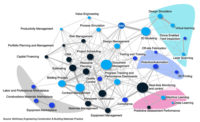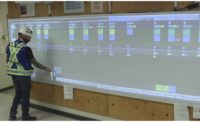New advances in automation, data collection and the perils of too many pilot projects were the top-line ideas at the first day of the 2021 ENR FutureTech conference.
Held virtually June 9 to 11, FutureTech gathers technology innovators, practitioners and users for a look at emerging technologies and case studies of tech implementations within the construction industry. Ticket-holders can stream any session on-demand for up to a year.
Day One opened with a deep-dive keynote from Carlos Crespo, head of Spanish contractor Acciona’s robotics and A.I. group on what aggressive deployments of automation and robotics means for construction. As a roboticist, Crespo is working to adapt cutting-edge automation technologies for the challenges of Acciona’s large, self-performed infrastructure projects.
Crespo says there are challenges, but he found that deployments improved as both the roboticists and their robots gained true field experience confronting the challenges of the jobsite. Crespo’s team ran a trial of Boston Dynamics' quadruped Spot robot on a data-gathering mission in a tunnel project.
The robot would walk the tunnel at the end of the day, scanning the environment with a LIDAR system, offering the project team regular progress updates. Able to autonomously navigate the muddy environment, Spot added a new layer of data awareness to the project.
While other companies have tried sending robots out into the field in limited trials, Crespo and his team are taking Acciona on an aggressive path of deploying automated systems on site, with an eye toward expanding the capabilities of field personnel.
“We need to get robots out of the lab; we need to get them dirty, get them tested, so they will see a lot of work on jobsites,” he said. “[With this] we can save a lot of money and effort.”
The Spot robot dog also turned up for an afternoon panel, where Brian Ringley, construction technologist at Spot's manufacturer, Boston Dynamics, Raffi Holzer, CEO of A.I. and data firm Avvir, and Adam Davis, partner and design system analyst at Foster + Partners, walked through a case study the design and engineering firm performed of the robot’s capabilities.
Social distancing requirements on jobsites during the COVID-19 pandemic in 2020 threatened to disrupt the pilot effort, but letting the little robot scan jobsites autonomously saved site personnel the trouble of walking the site again and again.
A mobile instrumentation platform like Spot can free up labor while performing some of the tedious reality-capture tasks that need to get done, explained Ringley.
“[We see now that] fixed sensors aren’t working, and we know moving sensors though the space is creating value, but people are too important for this kind of task,” he says. An unobtrusive robot like Spot can provide that value without using up workers’ valuable time, he adds.
In the same vein of technologists working alongside industry firms to refine their products, the afternoon keynote took a long, hard look at what it means to partner with tech startups. DPR’s innovation lead Kaushal Diwan and the contractor's CTO Atul Khanzode walked the audience through their company's experience executing countless pilot projects.
With vendors knocking on their door every day with new products, Diwan says DPR has had to put its foot down and insist on real-world evaluation processes for new technology.
“One thing we decided is we don’t invest in anything if we aren’t trying it out on a project or a pilot, getting that feedback on how it’s working out,” he told FutureTech attendees. “We have to learn if a solution is actually helping to solve a problem.”
Khanzode echoed this need to run real pilots to see results and pointed to how in recent years DPR has invested in more than 2,000 new ideas, with more than a few of them becoming breakout tech stars. He attributes this successful hit rate to careful deliberation and planning. “We get a lot of pitches, so we ask you [the startups] to respect our process,” he said.
Looking to what comes next for contractors partnering with tech startups, Khanzode recommends that companies start investing in some sound legal advice and begin drafting the contracts that will allow for sensible data-sharing while maintaining project security.
With many owners, startups and contractors still sorting out their data strategies, it will take some work to achieve the kind of shared-data environments that would benefit the industry at large.
“In the future, we’re seeing [ourselves] more in this data-broker area of things. We might be able to aggregate data across companies eventually," he said.






Post a comment to this article
Report Abusive Comment